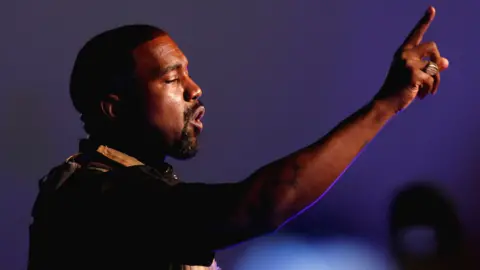Kanye West accused of antisemitic abuse in BBC documentary
 Reuters
ReutersThey say "never meet your heroes", but what happens when you make a documentary about them?
As Mobeen Azhar found out, it's... complicated.
The journalist has been a huge fan of Kanye West - now known as Ye - since the rapper's debut album The College Dropout which he bought on the day it came out in 2004.
Like many fans, he was drawn by Kanye's "audacious" outsider persona and his frequent, headline-grabbing rants.
He remembers an innovative artist who wasn't afraid to "say things that many other people wouldn't say".
But you don't have to be a Kanye superfan to know that a lot's changed since then.
In less than a year, the rapper's antisemitic remarks were largely behind the loss of his billionaire status and host of lucrative brand deals.
Warning: This article contains contains descriptions of racism and other offensive and discriminatory language
'I don't think we should ignore him'
It got fans, including Mobeen, wondering what was going on and searching for answers.
And it was while he was looking for them for his BBC Two documentary The Trouble with KanYe that he heard new accusations of Kanye subjecting someone to antisemitic abuse.
Former friend and business partner, Alex Klein, says the rapper told him "you're exactly like the other Jews" when they parted ways after he'd helped him work on the release of the Donda 2 album.
"I said 'do you really think Jews are working together to hold you back?' and he said 'yes, yes I do'," Alex tells Mobeen.
The tech entrepreneur claims Kanye described his comments about Jewish people as "not even a statement that I need to take back because look at all the energy around me right now. Without that statement, I wouldn't become president".
 BBC/Forest Ventures
BBC/Forest VenturesMobeen says he was really interested in "exploring how he's got to the point that he's got to".
"Like many people, I have watched his politics shift and his views shift in recent years. And I've been kind of frustrated, angry, confused by a lot of the things that he's put out there."
So he got a film crew, headed to Los Angeles and set about finding out how it started - and how it's going - for Kanye.
His first step was to learn about his journey on the way up, "speaking to people who had been in the room when a lot of the records that I know and have loved for a long time were made".
That included long-time Kanye producer Malik Yusef, who's worked on dozens of the rapper's tracks.
He told Mobeen the rapper's original mission was to "wake people up to the true plight of African people in this day and age".
But now, Malik believes Kanye has "thrown himself on the pyre of white nationalism" - the belief that white people are superior to people from all other racial and ethnic groups.
It's a strong statement, but one that Mobeen found some substance to in a chapel on the outskirts of LA.
 Getty Images
Getty ImagesMobeen says the Cornerstone Church is the home of the "Kanye West Empire" these days, and the base for his 2024 presidential campaign.
And the rapper's new collaborators, according to Mobeen's documentary, are a far cry from those he worked with when he was climbing the hip-hop ladder.
People like Nick Fuentes - a well-known streamer often described as a white nationalist known for antisemitic views - who is said to hold regular meetings at the church.
"He is a Holocaust denier. He doesn't believe in LGBT rights. And he is one of the people who is instrumental in the 2024 presidential campaign," says Mobeen.
Mobeen says this is particularly difficult for him, because Kanye "continues to have a huge amount of influence" and "his words really, really matter".
"I believe you'll see that influence and a lot of the philosophy that these people share coming out in the statements and the words of Ye.
"And I found that surprising. I found it shocking."
Mobeen says he'll "continue to love a lot of Kanye records".
"But in terms of the persona of Ye, that is something that I've checked out of," he says.
"I don't think we should ignore him. Because I think it's really important to have these discussions.
"I think that's how society moves forward. But I do think we should condemn those views. I think we have to, I think they're beyond the pale."
The Trouble with KanYe is on BBC Two at 21:00 BST on Wednesday 28 June and on iPlayer afterwards. An accompanying podcast The Kanye Story is also available on BBC Sounds.

